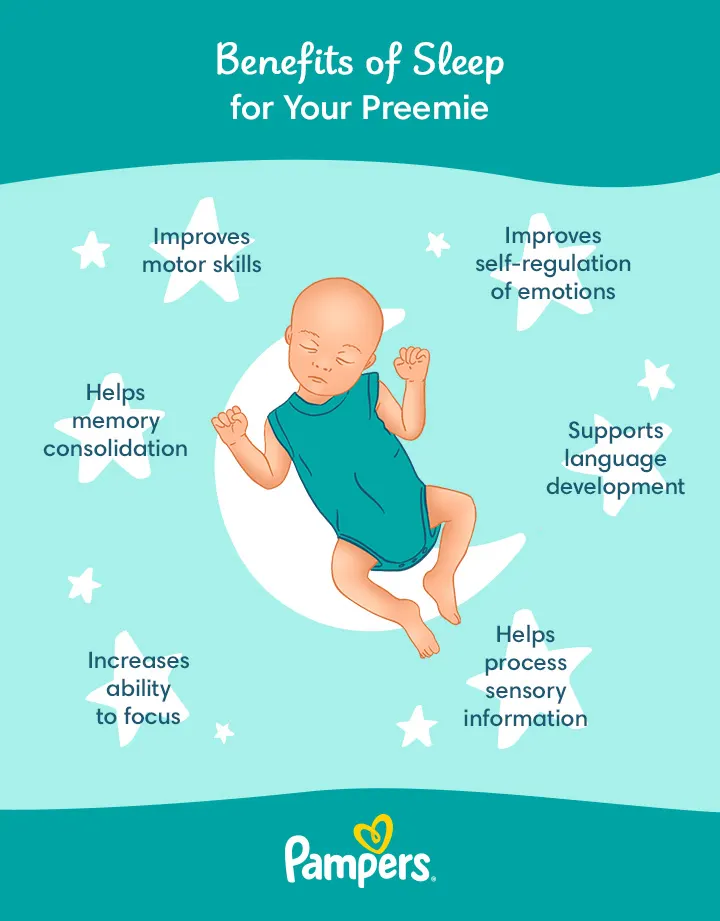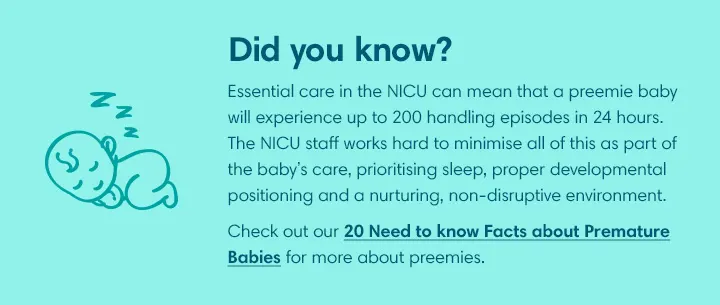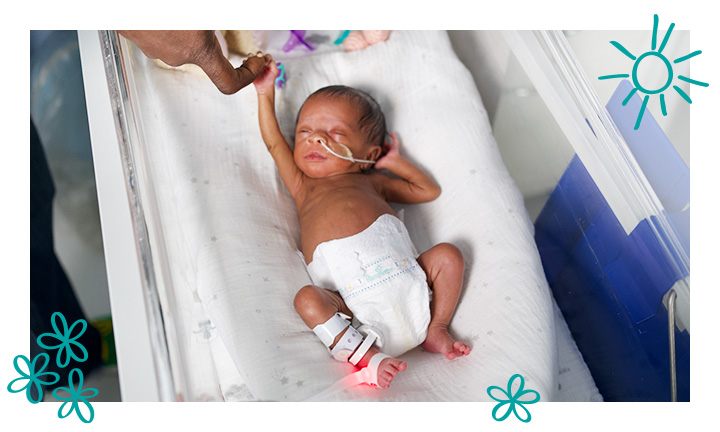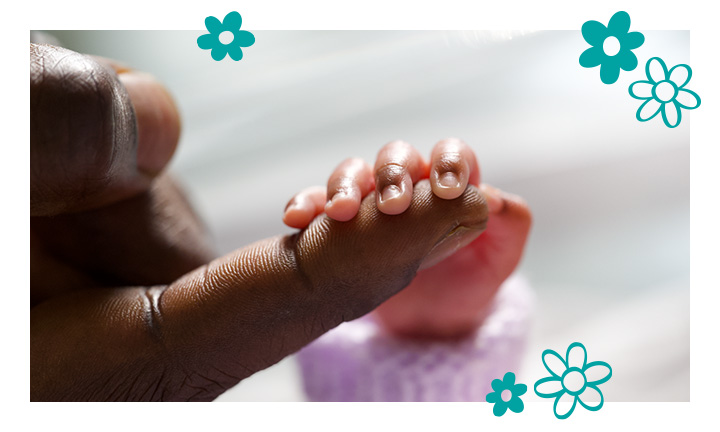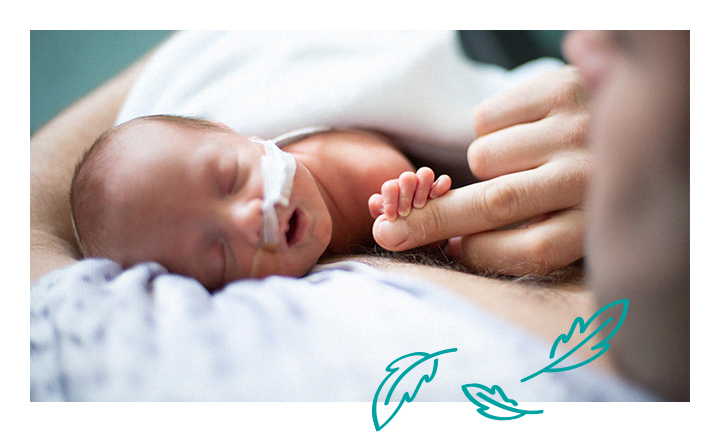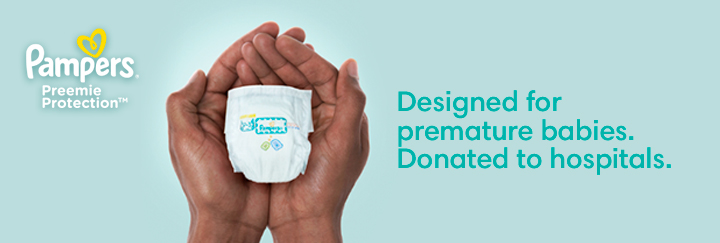
The Effects of Sleep on a Premature Baby’s Development
A newborn infant normally sleeps for around 75% of the day, while a premature baby can spend up to 90% of their time sleeping – that’s more often than they’re awake. We’re going to explore the importance of sleep and how it contributes to the cognitive and physical development of babies. Read on to discover the benefits of sleep, such as improved mood, enhanced motor skills and better memory organisation, as well as how you can help your preemie get some quality sleep.
How Much Does a Premature Baby Sleep?
You may be surprised to learn that premature babies spend more of their time asleep than awake. In fact, full-term babies spend around 75% of their time sleeping, whilst most preemies will spend around 90% of their time in the land of slumber.
In the third trimester of pregnancy, babies begin to form sleep patterns and may sleep for up to two hours at a time. During this time, in the warmth and comfort of the womb, babies are going through cognitive and physical developments to prepare themselves for the outside world.
Unfortunately, premature babies must complete their development outside of the womb. Hence, why they need more sleep (but we’ll delve deeper into that later). Remember, every baby is different, so some may sleep more or less than others. If you have any concerns about your little one’s sleep, contact your GP or health visitor.
Phases of Sleep
Premature babies spend more time in active sleep than full-term babies, which can cause more sleep disturbances. However, over time, preterm babies will experience more deep sleep. There are two types of sleep: active sleep (REM) and quiet sleep (non-REM). Active sleep is characterised by increased brain activity and eye movement, while quiet sleep is a deeper type of sleep where breathing and heart rate slow down. Both types of sleep are important for brain development, energy restoration, and processing memories and emotions.
Why is Sleep Important for Your Preterm Baby?
Due to your premature baby’s early arrival, they may need additional support to reach their developmental milestones. You can find out more about preemie development week by week here. As well as the care they’ll receive in the NICU, sleep is the key to their cognitive and physical development. This means that optimising your little one’s sleep may promote physical development, including motor skills and sleep quality in the future, and cognitive development, such as memory, focus, temperament and language skills. Keep reading to discover more about sleep and the possible effects on development – and how all that snoozing is benefiting your premature baby.
How Sleep Impacts Your Preterm Baby’s Self-Regulation Abilities
How can sleep affect your baby’s ability to regulate their emotions? Sleep plays a vital role in promoting brain development and facilitating the brain's ability to process information effectively, regulate emotions, and make decisions. While preterm birth can sometimes lead to disrupted sleep patterns, it's important to note that providing adequate support and care can help preemies. Studies show that babies and children who get more and better-quality sleep tend to have easier temperaments, have better social skills, and are more approachable and adaptable.
How Sleep Impacts Your Premature Baby’s Motor Development
During active (REM) sleep, babies tend to twitch and move around more. Research has shown that these twitching movements may help a baby’s brain learn the workings of their limbs during sleep. This can help the development of motor skills in babies. After some good quality sleep, babies and children have the chance to wake up feeling ready to move, learn and develop!
How Sleep Impacts the Cognitive Development of Premature Babies
Sleep helps neurons in the brain and nervous system develop and mature, allowing babies to process and explore their environment. When we sleep, our brains process all the information we’ve learned throughout the day. And interestingly, children are slightly better at storing and remembering information after sleeping than adults are. Sleep helps babies consolidate memories and process sensory information, such as sights, sounds, smells and even new faces – helping them anticipate and respond to their environment in a more efficient and appropriate manner. Don’t underestimate how much your little one’s brain works, even while snoozing!
How Can You Help Improve the Sleep of Your Preterm baby?
Whether your little one is in the NICU or at home, their quality of sleep is so important to their development. But there are many things that may disrupt the delicate sleep of a preterm baby. However, we’ve outlined how you can help minimise sleep disturbances and give your baby the rest they need and deserve. Read our tips on how to help improve your baby’s sleep in the NICU and at home, written in collaboration with Dr Louisa Gossé, Developmental Neuroscientist.
Sleep in the NICU
The NICU is the best place for your preterm baby to receive the care that they need; however, it can be a stimulating environment and there are certain factors that can disturb their sleep, such as medical interventions, nappy changes, handling, bright lights and all the various sound within the unit. Fortunately, the NICU staff are finding ways to help minimise disruptions and maximise your baby’s sleep. These include:
Sleep at home
When caring for your baby at home creating an optimal sleeping environment may help your preterm baby get the quantity and quality of sleep they need. Here are some tips to help improve their sleep:
FAQS AT A GLANCE
According to experts, sleep may have a positive effect on both physical and cognitive development. Studies have shown that it can help to improve:
- focus and attention
- language and vocabulary growth
- working memory
- temperament and regulating emotions
- sleep quality throughout childhood
- mental health
- motor skills.
The Bottom Line
Every baby is unique and so is their sleep. Because premature babies don’t spend as much time developing in the uterus as full-term babies, they need to continue their development in the outside world – and sleep is extremely important in this process! Sleep can promote both physical and cognitive development in your little one; helping to improve things like memory, concentration, temperament, motor skills and language development. You can help improve your preterm’s quality of sleep by learning their sleep and wake cycles, forming a calming bedtime routine, reducing bright lights and noises and using skin-to-skin contact. And don’t forget to make the most of your little one’s sleep time by taking some naps yourself!
How We Wrote This Article The information in this article is based on the expert advice found in peer reviewed scientific studies, trusted medical and government sources, such as the National Health Service (NHS). You can find a full list of sources used for this article below. The content on this page should not replace professional medical advice. Always consult medical professionals for full diagnosis and treatment.
- Pampers. HELPING PRETERM BABIES SLEEP TODAY FOR A BETTER TOMORROW: Written in collaboration with Louisa Gossé, Developmental Neuroscientist.
- https://www.bliss.org.uk/parents/going-home-from-the-neonatal-unit/when-you-get-home-from-the-neonatal-unit/sleeping
- https://www.enfamil.com/articles/importance-of-sleep-child-development/
- https://www.mdpi.com/2227-9067/4/10/90
- https://www.mdpi.com/2227-9067/9/5/626/htm
- https://www.nhs.uk/pregnancy/week-by-week/13-to-27/22-weeks/
- https://pubmed.ncbi.nlm.nih.gov/14505599/
- https://pubmed.ncbi.nlm.nih.gov/23893532/
- https://www.ncbi.nlm.nih.gov/pmc/articles/PMC2768951/
- https://pubmed.ncbi.nlm.nih.gov/27322102/
- https://pubmed.ncbi.nlm.nih.gov/21311602/
- https://pubmed.ncbi.nlm.nih.gov/17707119/
- https://www.sciencedirect.com/science/article/abs/pii/S0163638321001387
- https://www.sciencedirect.com/science/article/pii/S1087079221000320
- https://www.sciencedaily.com/releases/2013/02/130226081155.htm
- https://pubmed.ncbi.nlm.nih.gov/32609357/
- https://pubmed.ncbi.nlm.nih.gov/28760193/
- https://www.researchgate.net/profile/Scott-Robinson-7/publication/280611384_Motor_Development/links/5ce4352da6fdccc9ddc49f08/Motor-Development.pdf
- https://www.tommys.org/pregnancy-information/after-birth/your-babys-sleep-patterns
Read more about Prematurity
Join Pampers Club and get:

